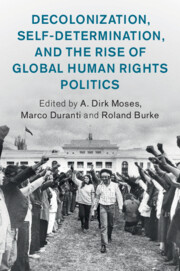
- Cited by 6
-
Cited byCrossref Citations
This Book has been cited by the following publications. This list is generated based on data provided by Crossref.
Riegner, Michael and Bonilla Maldonado, Daniel 2021. Historia, Estado y nación. El constitucionalismo y los procesos de descolonización. Vniversitas, Vol. 70, Issue. ,
Berger, Tobias 2022. Worldmaking from the margins: interactions between domestic and international ordering in mid-20th-century India. European Journal of International Relations, Vol. 28, Issue. 4, p. 834.
Mihr, Anja 2023. Human Rights Dissemination in Central Asia. p. 31.
Orchard, Phil and Wiener, Antje 2023. Norm Research in Theory and Practice. SSRN Electronic Journal,
Wedin, Tomas 2023. On the French Origins of Samuel Moyn’s the Last Utopia. Global Intellectual History, p. 1.
Wiener, Antje and Orchard, Phil 2023. Social in Practice, Contested in Principle: Future Norm Research. SSRN Electronic Journal,
- Publisher:
- Cambridge University Press
- Online publication date:
- June 2020
- Print publication year:
- 2020
- Online ISBN:
- 9781108783170




